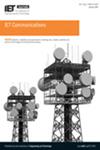Spectrum utilization improvement for multi‐channel EH‐CRN with spectrum sensing
IF 1.5
4区 计算机科学
Q3 ENGINEERING, ELECTRICAL & ELECTRONIC
引用次数: 0
Abstract
Due to the ever‐growing applications and services of the Internet of Things (IoT), designing energy‐efficient and spectral‐efficient transmission schemes to support IoT devices for the 6G space–air–ground integrated networks becomes much more challenging. Fortunately, energy harvesting (EH) and cognitive radio (CR) technologies have been proposed to alleviate these challenges. Inspired by this fact, this paper studies the issue of spectrum reuse in terms of spectrum utilization efficiency (SUE) in the energy harvesting cognitive radio network (EH‐CRN), where multiple primary transceiver pairs, one multi‐antenna secondary transmitter (ST), and one secondary base station (SBS) coexist. To characterize the impact of small‐scale fading and improve the SUE of the EH‐CRN with perfect spectrum sensing (SS), an adaptive scheme concerning SS, channel selection, EH, and data transmission (SCED) scheme are proposed, where the ST selects the channels for SS based on the residual energy, and adjusts the duration of EH and data transmission with respect to the sensing results. Then the Markov decision process problem of SUE is formulated, which is challenging due to the infinite system space and action space. To tackle the Markov decision process problem, the system space and action space are discreted, and divide the ST into the energy‐limited case and energy‐sufficient case according to specific energy condition. Moreover, theoretical results are extended to the EH‐CRN with imperfect SS. Numerical results show that the SUE under the SCED scheme in perfect SS and imperfect SS scenarios is better than that under other schemes.利用频谱感应提高多通道 EH-CRN 的频谱利用率
由于物联网(IoT)的应用和服务不断增长,设计高能效和高频谱效率的传输方案以支持 6G 空-空-地一体化网络中的物联网设备变得更具挑战性。幸运的是,能量收集(EH)和认知无线电(CR)技术的提出缓解了这些挑战。受此启发,本文从频谱利用效率(SUE)的角度研究了能量收集认知无线电网络(EH-CRN)中的频谱重用问题,在该网络中,多个主收发器对、一个多天线副发射器(ST)和一个副基站(SBS)共存。为了描述小尺度衰落的影响并改善具有完美频谱感知(SS)的 EH-CRN 的 SUE,提出了一种关于 SS、信道选择、EH 和数据传输(SCED)方案的自适应方案,其中 ST 根据剩余能量为 SS 选择信道,并根据感知结果调整 EH 和数据传输的持续时间。然后提出了 SUE 的马尔可夫决策过程问题,由于系统空间和行动空间的无限性,该问题具有挑战性。为了解决马尔可夫决策过程问题,对系统空间和行动空间进行了离散化处理,并根据具体的能量条件将 ST 划分为能量受限情况和能量充足情况。此外,还将理论结果扩展到具有不完美 SS 的 EH-CRN 上。数值结果表明,在完美 SS 和不完美 SS 情况下,SCED 方案的 SUE 优于其他方案。
本文章由计算机程序翻译,如有差异,请以英文原文为准。
求助全文
约1分钟内获得全文
求助全文
来源期刊

IET Communications
工程技术-工程:电子与电气
CiteScore
4.30
自引率
6.20%
发文量
220
审稿时长
5.9 months
期刊介绍:
IET Communications covers the fundamental and generic research for a better understanding of communication technologies to harness the signals for better performing communication systems using various wired and/or wireless media. This Journal is particularly interested in research papers reporting novel solutions to the dominating problems of noise, interference, timing and errors for reduction systems deficiencies such as wasting scarce resources such as spectra, energy and bandwidth.
Topics include, but are not limited to:
Coding and Communication Theory;
Modulation and Signal Design;
Wired, Wireless and Optical Communication;
Communication System
Special Issues. Current Call for Papers:
Cognitive and AI-enabled Wireless and Mobile - https://digital-library.theiet.org/files/IET_COM_CFP_CAWM.pdf
UAV-Enabled Mobile Edge Computing - https://digital-library.theiet.org/files/IET_COM_CFP_UAV.pdf
 求助内容:
求助内容: 应助结果提醒方式:
应助结果提醒方式:


